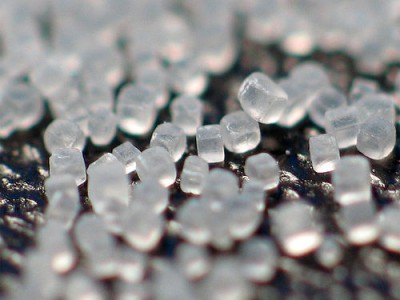Salt: A Matter of Taste, And Genes
/https://tf-cmsv2-smithsonianmag-media.s3.amazonaws.com/filer/20110520090135table-salt-by-parl_3594329_f3e39a44ed-400x300.jpg)
On the premiere episode of Top Chef's seventh season last night, there was a moment when judge Tom Colicchio dismissed one contestant's dish with a single complaint: "I couldn't get past the salt."
It's not the first time he's said a dish was "way too salty." How could these skilled chefs keep making such a seemingly simple mistake? Perhaps it's just the stress of being in an intense, highly publicized competition. Or perhaps the line between "salty" and "too salty" is shakier than most of us realize. Genetics, it turns out, toys with our taste buds in several different ways. (Lisa provided a great primer on the genetics of taste a few weeks ago.)
A new study led by John Hayes, a food scientist at Penn State College of Agricultural Sciences, shows that so-called supertasters, who perceive flavors more intensely than the ordinary-tongued masses, tend to consume more salt in their diet than less-sensitive "nontasters." That may sound counterintuitive, but he notes that salt helps to block out bitter tastes which supertasters might otherwise find overwhelming.
"Despite adding less salt...supertasters consumed more sodium through food, as salt was more important to preference, both for its salty taste and masking of bitterness," the study concluded.
And while nontasters don't consume as much salt in the form of processed foods like chips and pretzels, they tend to be more heavy-handed with a salt shaker at the table (or in the kitchen, presumably) than other people.
Not everyone is either a supertaster or a nontaster—about 50 percent of us fall somewhere in the middle—but this suggests to me that chefs whose tongues tend toward either extreme might be prone to over-salting.
When it comes to diet and health concerns, it's a bit clearer where to draw the line. Salt contains sodium, and too much sodium intake can lead to high blood pressure, increased risk of stroke and heart disease, but how much is too much? The USDA's current guidelines recommend limiting sodium intake to 2,300 milligrams a day in healthy individuals, and an advisory panel has recommended lowering the sodium allowance to 1,500 mg for everyone. (The salt industry says such a drastic reduction would be "reckless" and argues that it may be safe to consume up to 5,750 mg of sodium a day, but I'm inclined to take their advice with a grain of...well, you know.)
Do you think you might be more or less sensitive to saltiness than most people?
